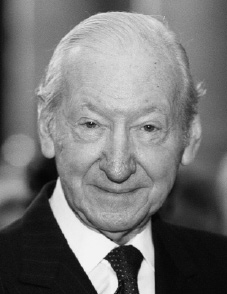Kurt Waldheim
Kurt Waldheim, a diplomat with a selective memory, died on June 14th 2007, aged 88
ONCE, in more glorious times, the empire of Austria stretched from Prague and Cracow to Trent, below the Dolomites, and Ragusa on the Adriatic. Vienna drew the intelligentsia of Europe. Hungarian wheat fed the Austrians, and Bohemian coal kept their economy booming. Dozens of tribes and peoples clustered under the Habsburg wing, forming Europe’s first and last buffer against the Turks.
This was the Austria Kurt Waldheim pined for. It was not the one he was born into. In 1918 Austria – often “she” in Mr Waldheim’s writings, like an unfortunate princess in a fairy tale – was a “defeated, ruined, truncated remnant” of what she had been. The wheatfields and the coal mines had been forfeited. Moravia, South Styria and South Tyrol had been carved off too. Yet in 1919, “to add insult to injury”, Austria was obliged to pay reparations to countries ravaged by the fighting. Mr Waldheim, a man of old-fashioned gallantry, could only uphold and defend her.
Her fate was his own. He was “always hungry” as a boy, staring hopelessly at the rare cakes and biscuits he could not have, as the country was hit by periodic famine. Austria was impoverished; his family, too, had lost all their savings when the crown was devalued. “In severe psychological shock” Austria had recurrent dreams of an alliance with Germany, sometimes the rescuing hero and sometimes the overbearing, jackbooted rapist. The young Kurt, too, flirted with Hitler’s Reich; but somehow, like Austria, failed to recall the details.
In 1985, preparing to run for the presidency of Austria after a distinguished career as a diplomat and ten years as secretary-general of the United Nations, he produced an autobiography, “In the Eye of the Storm”. “In the course of writing this book”, his introduction ran, “I have come to appreciate the frailty of memory.” Indeed. In 1938, after the Anschluss that absorbed Austria into Nazi Germany, he remembered his father being arrested by the Gestapo and himself, an intrepid member of the Austrian Jungvolk, distributing pamphlets urging citizens to resist and being “quite badly beaten up for it”. Journalists and researchers, who began to investigate him in 1986, found him instead in an SA horse detachment, wearing the brown shirt unabashed.
He misremembered more. In 1941, forced into the Wehrmacht as all Austrians were unless they had money or connections, he went to the Russian front; his memory told him that his unit was full of dissenters, that he read anti-Nazi pamphlets under the blankets and that when he was wounded he returned, relieved, to his law studies in Vienna. Fact, confirmed by an international commission of historians in 1988, was that by April 1942 he was back in uniform in the Balkans and that within a year he was in Army Group E, commanded by a man so brutal that he was later executed for war crimes.
“A clerk and an interpreter” was Mr Waldheim’s description of his job, when confronted; too lowly to notice the long lines of Jews, a quarter of the town’s population, driven out of Salonika to the death camps, or to smell the corpses of partisans strung up on makeshift gallows along the roads, or to hear – though they

happened some hundred yards from his office – the summary executions of captured British commandos.
He had not known, said Mr Waldheim. Or, if he had, to know was not a crime. Nor was it a crime to fail to defy orders, though some might wish he had. At the urging of the Austrian government, “moral guilt” was removed from the report on him. He did his duty. Like Austria, he dulled his conscience and lost his identity for the duration of the war. And after it he made himself a victim, travelling home from Vienna with his wife and baby daughter in a windowless cattle-car, “refugees”, like thousands of his fellow-countrymen.
While secretary-general of the UN from 1972–82, a post in which he hoped to “evoke the conscience of mankind”,his self-delusion went undetected. It was noticed that he showed uncommon deference to the powerful, preferring quiet diplomacy and studied neutrality, as Austria now did, to ruffling feathers; but in those years, with the world frozen into Soviet and American blocks and the UN turbulent and impotent, he had little choice. Only later, as his story began to surface under the persistent digging of Profil journalists and the World Jewish Congress, did it seem that he might have bowed and kissed hands just a little too much in life.
Many Austrians thought it did not matter. Defiantly, they voted for him as their president in 1986 – and saw him sit for six years in the Hofburg without a state invitation, as the world turned its back on him. Ostracisation shocked both the country and the man. It also forced an examination of conscience that has not ended yet.
Mr Waldheim’s last will and testament regretted “Nazi crimes”, but not his own behaviour. Moral ambiguity remained, and might even save him. “When death comes to you,” he wrote, “all the distinctions in life disappear. Good and bad, dark and light, merits and mistakes, stand now in front of a judge who knows the truth. I can go there with trust, because I know His justice and His mercy.”